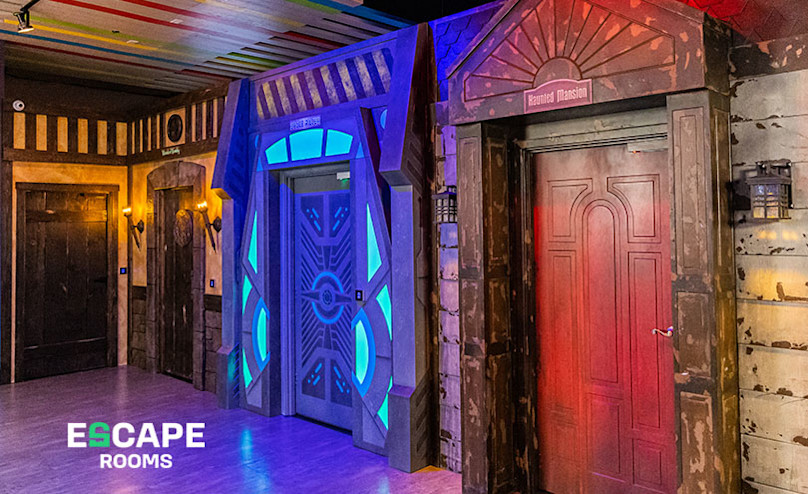Fun and Challenging Escape Room-- Strategy Your Next Adventure
Fun and Challenging Escape Room-- Strategy Your Next Adventure
Blog Article
Group Approaches: How to Collaborate Effectively in an Escape Area
Groups have to actively listen to each participant's insights, designate functions that align with individual strengths, and preserve normal check-ins to make certain emphasis and avoid redundancy. By promoting a setting that values cohesion and flexibility, groups can considerably increase their efficiency and success rates.
Establish Clear Communication
To promote clear communication, it is essential to designate a main factor of call for details dissemination. Quick, concentrated updates from each team participant can keep the group informed without frustrating them with information.

Assign Functions Purposefully
While clear interaction establishes the foundation for effective synergy, designating duties strategically ensures that each staff member's staminas are made use of properly. In a getaway room circumstance, the time-sensitive and complex nature of challenges necessitates an efficient technique to task delegation. By recognizing and leveraging specific expertises, groups can optimize their analytical abilities and improve general performance.
First, evaluate the one-of-a-kind abilities and features of each individual. Somebody with a keen eye for information could stand out in finding surprise things, while a logical thinker could be better suited to addressing challenges. It's equally important to have a leader who can look after development, take care of the timeline, and make definitive calls when required. This duty often needs strong business and interpersonal abilities.
2nd, make certain that functions are adaptable and adaptable. As brand-new obstacles arise, the group must be able to pivot, reallocating jobs as required. This flexibility helps preserve momentum and prevents traffic jams that could take place due to inflexible role jobs.
Ultimately, a strategic strategy to duty job not just takes full advantage of the toughness of each group participant yet additionally cultivates a natural setting, driving the team in the direction of an effective retreat.
Use Diverse Skills
Identifying and using the varied skills within your group can dramatically elevate your efficiency in an escape room. Each group member brings unique strengths to the table, and effectively leveraging these abilities can expedite analytical and improve total efficiency. A team participant with strong analytical skills may excel at figuring out intricate codes or patterns, while an additional with eager observational abilities may quickly identify concealed ideas that others may forget.
Encourage group participants to voice their insights and ideas without delay, guaranteeing that all prospective solutions are taken into consideration. Furthermore, appointing jobs that align with each member's toughness can avoid traffic jams and guarantee that progress is constant.
Additionally, diversity in skills usually translates to diversity in assuming designs, which is very useful in a getaway room setup. While some difficulties may need sensible reasoning and precision, others could benefit Source from creative and lateral reasoning. By identifying and leveraging this diversity, teams can address a wider variety of obstacles more efficiently, thus enhancing their opportunities of an effective getaway.
Manage Time Effectively

Determine visible challenges and separate tasks based on team participants' toughness, making certain that no one is still. This technique can aid maintain the group focused and avoid time from slipping away undetected.
Additionally, prevent one-track mind. If a problem is taking as well long, rotate team participants or proceed to another obstacle, returning later with fresh perspectives. Interaction is paramount-- keep everyone upgraded on addressed problems and remaining tasks to prevent redundant initiatives.
Last but not least, utilize any kind of tips or ideas sparingly but strategically - best escape room. Knowing when to ask for help can conserve valuable time. By adhering to these time administration concepts, groups can considerably boost their opportunities of a successful and satisfying escape space experience
Debrief and Mirror
Representation is a necessary aspect of team growth and enhancement in the context of retreat rooms. As soon as the challenge is completed, whether successfully or otherwise, it is critical for the group to engage in an Check This Out organized debriefing session. This procedure enables group participants to analyze their performance, identify strengths, and determine areas for enhancement.
Begin the debrief by reviewing what worked out. Highlight certain circumstances of reliable communication, analytic, and partnership. Recognizing these positive actions reinforces them and urges their rep in future difficulties.
Next, resolve the obstacles ran into. Talk about minutes of confusion, miscommunication, or ineffective strategies. Urge an open and constructive discussion where employee can share their perspectives without worry of criticism. This fosters a society of continuous improvement and understanding.
Conclusion
In conclusion, successful cooperation in a retreat area is predicated upon clear interaction, strategic role projects, the efficient application of varied skills, and competent time administration. By creating a natural and flexible team environment, the likelihood of efficiently resolving challenges and accomplishing the objective of escaping the room is considerably enhanced.
Report this page